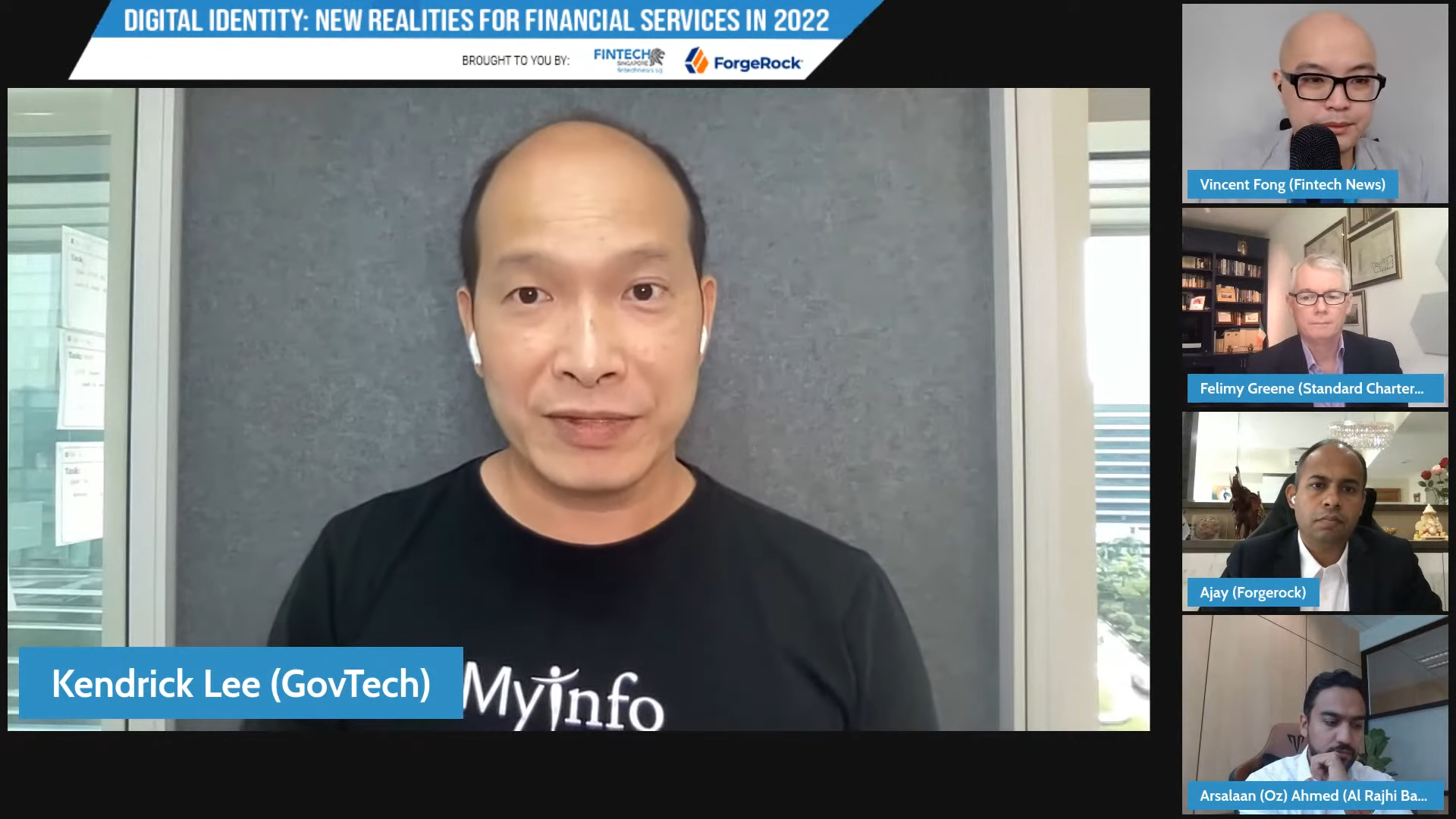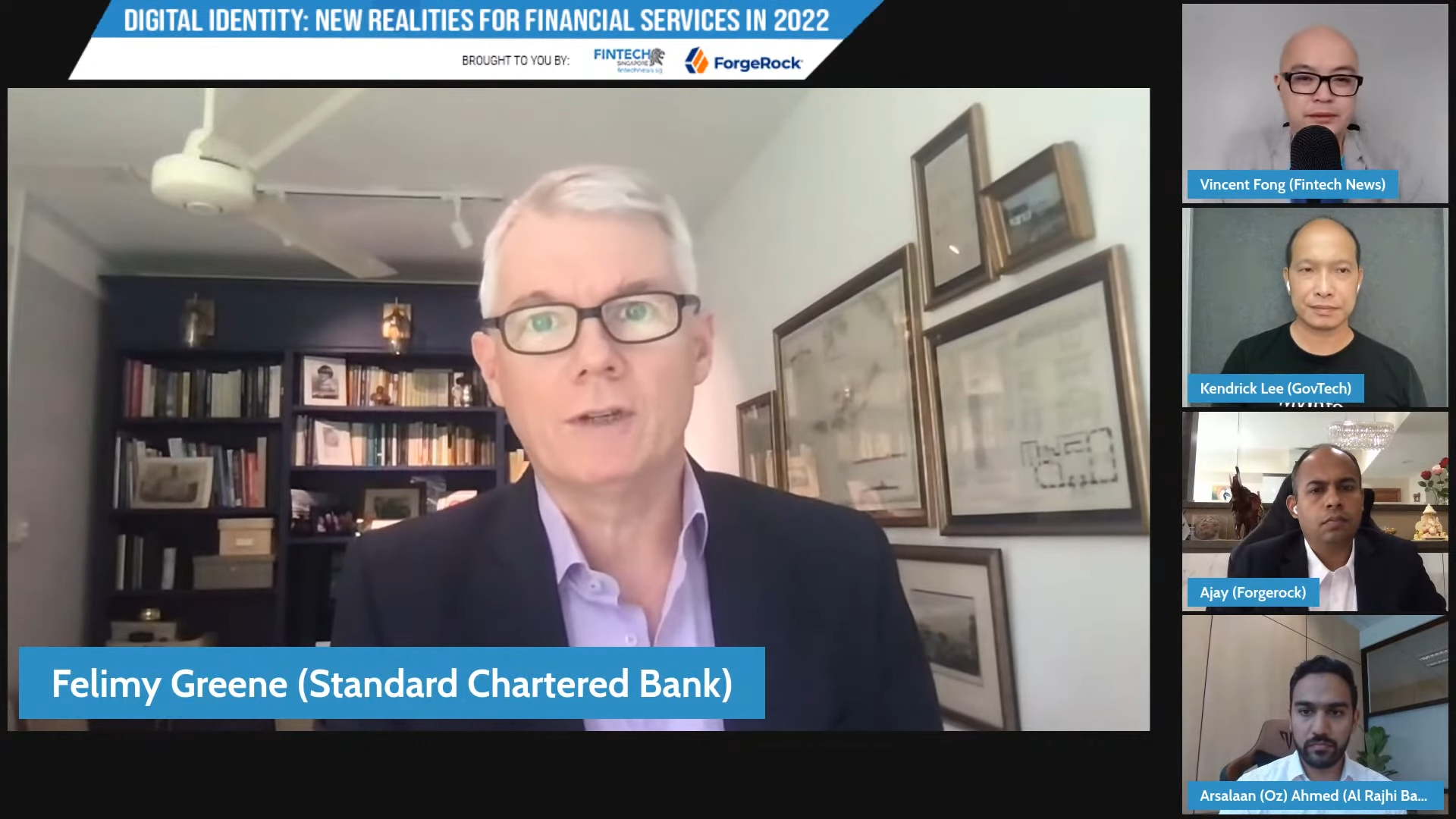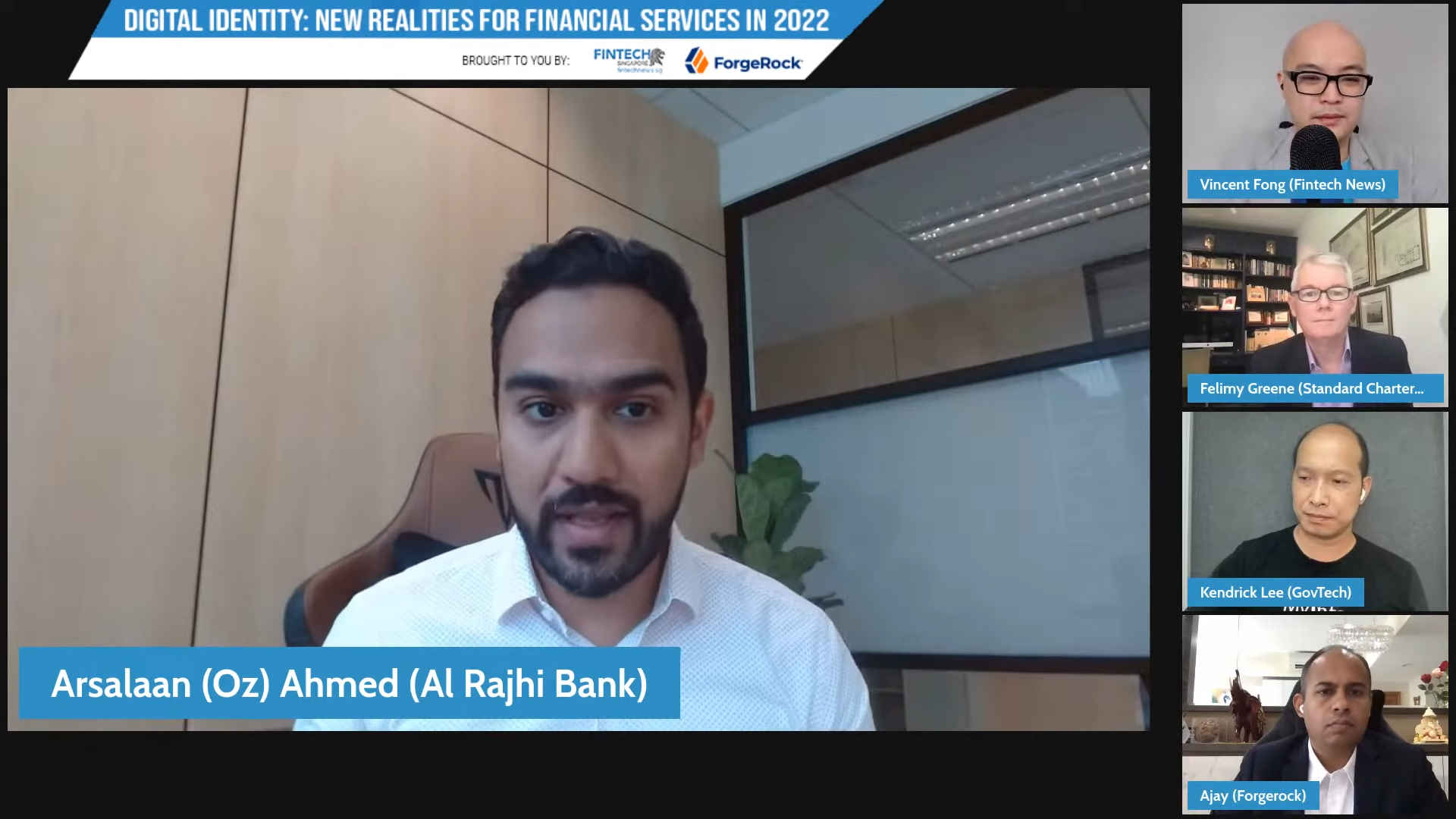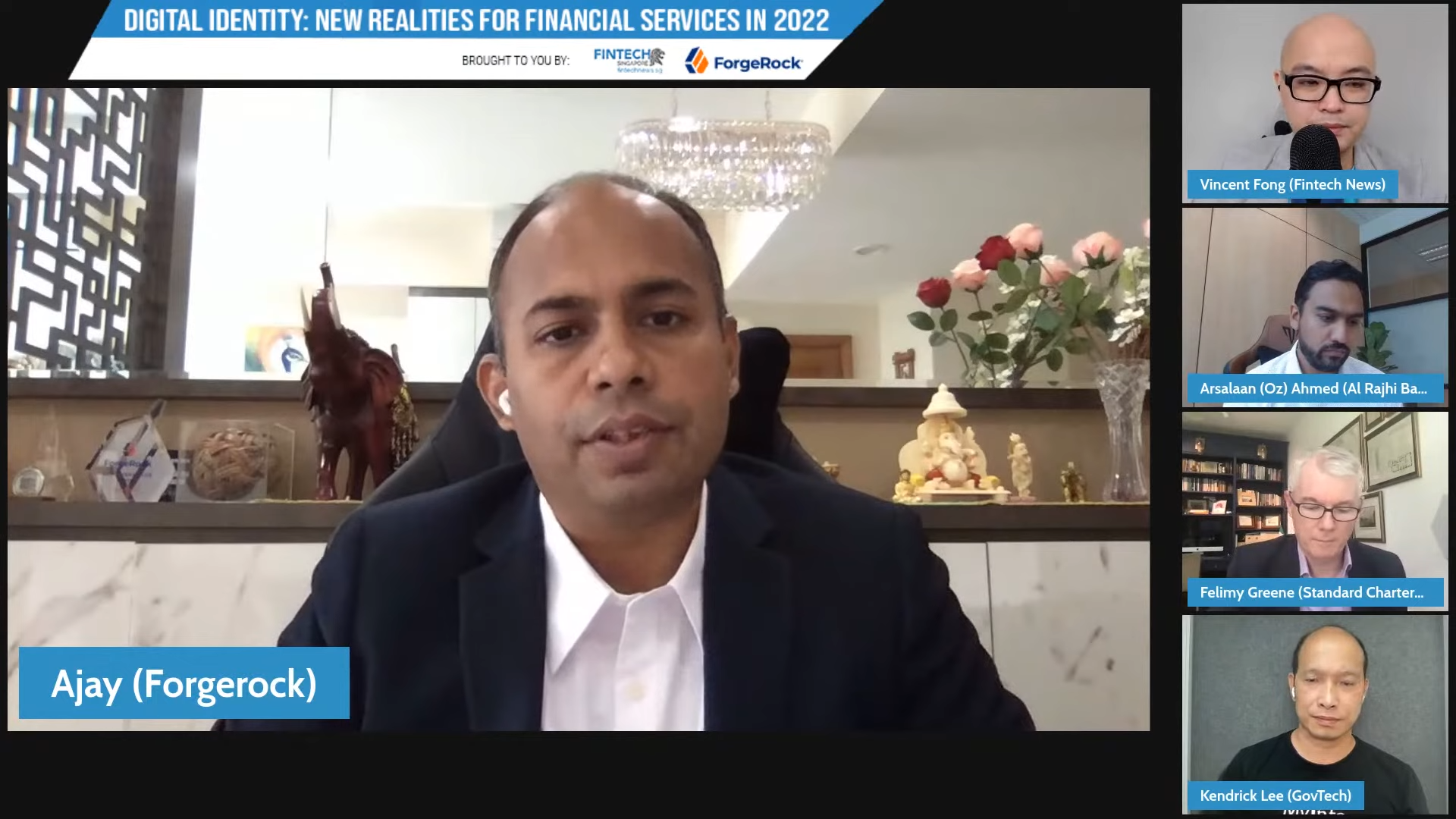Around the world, digital identity has emerged into one of the most significant technology trends, promising to not only improve access to financial services, but also enable civic and social empowerment by unlocking critical services including government benefits and education.
During Fintech Fireside Asia’s latest panel discussion, top executives and government officials representing the Government Technology Agency of Singapore, Standard Chartered Bank, Al Rajhi Bank Malaysia and ForgeRock, a multinational identity and access management software company, explored the role of digital identity in creating seamless customer experiences in the banking sector, as well as its potential in improving access to key public services.
COVID-19 has accelerated the shift to digital, the speakers said, highlighting the fundamental role digital ecosystems can play in helping governments and organizations rapidly deliver services and relief to their people. This has raised the stakes for robust digital identification.
“Many countries are implementing digital identity programs and many businesses are beginning to see that it is foundational to the digital economy and digital society,” said Kendrick Lee, Director, National Digital Identity, Government Technology Agency of Singapore.
“We see digitalization as the movement of data across boundaries of organizations, systems and borders. But what is important is the ability to identify who’s the subject and make sure that the subject is able to give consent.”

Kendrick Lee, Director, National Digital Identity, Government Technology Agency of Singapore
By providing the process and structure to verify an individual’s identity, a digital identity infrastructure is a key foundation of the digital society, Kendrick said, and holds the promise of enabling economic value creation by promoting digitalization and driving efficiencies.
For organizations, this means the ability to automate and scale customer identification processes, drastically reducing customer acquisition time by 80% and improving approval rates by 15% due to better data quality.
“The network effect of this, for banking and other sectors, then the economic impact for the country, is multiplied and potentially exponential,” Kendrick said. “We’re quite excited about where we can go with this.”
Accessibility and inclusion
Around the world, nearly one billion people still do not have an official proof of identity, preventing them from accessing key services and goods, said Felimy Greene, COO/Global Head of Onboarding, Standard Chartered Bank. Digital identity could play an important role in providing these individuals with a legal form of identification and giving them access to basic financial services.
“This is important discussion because of [we need] to move forward in the shared agenda and intention of inclusion and accessibility, balanced by safety and soundness,” Felimy said.
“Digital has been tremendous in terms of driving access to financial services … We’re still very much at the beginning of the [digital identity] journey but we’ve come to a good place. The pandemic has affected a lot of people’s lives, but one of the dividend from that has been the pace of change, which has been positive.”

Felimy Greene, COO:Global Head of Onboarding, Standard Chartered Bank
In Singapore, SingPass and Myinfo, the country’s authentication getaway and digital personal data platform, allow banks to onboard new customers in just a few minutes, Felimy noted, enabling financial institutions to provide instant product and services such as immediate approval and provisioning of bank accounts, credit cards, personal loans and remittance services.
“Singapore is further down the road than others and we can see the benefits of that,” Felimy said. “India is [another] amazing story in terms of what they’ve done with Aadhaar, the world’s largest national biometrics identity scheme, and that’s been incredibly enabling in terms of doing business at scale in that country.
“It’s a win-win for the client, for the bank, and for society because, by having this bedrock of digital identity managed by the government, you make it very hard for people to defraud and to fake identity.”
For Arsalaan (Oz) Ahmed, Chief Executive Officer, Al Rajhi Bank Malaysia, perhaps one of the biggest opportunities brought about digital identity is embedded finance.
A buzzword of 2022, embedded finance refers to the integration of financial services and tools within the products and services of a non-financial organization.
Essentially, embedded finance revolves around meeting the customer where they are in their journey and providing them with the most relevant financial solution at that particular time, whether that be a loan, payment program or insurance plan.
“Some of the best financial solutions are not put together by banks and insurance companies, [but by] particular boutique houses that address [specific] situations,” Oz said. “[By bringing these solutions] natively to [your] customer base … you’re able to serve people better and … have people with great ideas in an ecosystem.”

Arsalaan (Oz) Ahmed, Chief Executive Officer, Al Rajhi Bank Malaysia
Preventing fraud and cyber crime
Undeniably, digital banking trends like embedded finance and open banking are presenting value for both consumers and banks, promising increased stickiness, new revenue streams, and improved customer experiences.
But these finance apps are also attracting the attention of cybercriminals, primarily because they often include payment transactions and connections to bank accounts. This, coupled with the widespread shift to online channels during COVID-19, has seen scams and fraudulent activities surge.
“With the pandemic, cyber fraud and crime has become a bigger business,” said Ajay Biyani, Regional Vice President, ForgeRock. “Since everything is online, there are many ways [for fraudsters to] reuse the credentials [obtained]. We’ve seen phishing scams causing millions of dollars’ worth of losses with banks, outages caused by ransomware attacks making services or offerings not available for a long period of time, causing a lot of impact.”

Ajay Biyani, Regional Vice President, ForgeRock
But perhaps the most worrisome trend Ajay said he’s seeing is the number of banks that still rely on outdated techniques to verify customers, resorting to highly vulnerable methods like SMS one-time passwords (OTPs).
“The mindset needs to change,” Ajay said. “[The most forward-thinking] banks … have taken a very different approach to solve the problem. They’ve built an orchestration layer on top [of their existing system], which plugs into the system … Then what happens is, piece by piece, they enhance that multi-factor authentication. [They are building] journeys with controls and risk calculation around [each type of] transaction.”
But for banks to fully embrace a risk-based authentication approach, Felimy said they will need to make use of data and behavioral analytics. Using data science, machine learning (ML) algorithms, and artificial intelligence (AI), financial institutions can detect anomalies in user behavior and proactively catch fraud attempts.
“This notion of behavioral identity is incredibly important. It’s about how well we know our customers … now in its digital era,” Felimy said.
“Digital gives us a lot of possibilities and we need to leverage them … in a way that is respectful and with consent from our clients … We need to walk that line between creating too much friction, in which case we create different risks where they start writing passwords down, and keeping it easy.
“If we mix technology with the continued education of our staff and customers, I think we can continue to stay ahead of [threats]. It’s going to keep moving and we have to keep moving as well as with that evolving threat.”
The post Digital Identity as the Foundation of the Digital Society appeared first on Fintech Singapore.
- "
- 2022
- a
- ability
- About
- accelerated
- access
- accessibility
- accessing
- acquisition
- across
- activities
- address
- agency
- ahead
- AI
- algorithms
- amazing
- analytics
- Another
- approach
- apps
- around
- artificial
- artificial intelligence
- Artificial intelligence (AI)
- Asia’s
- attention
- attracting
- Authentication
- automate
- available
- Bank
- Banking
- Banks
- because
- become
- Beginning
- benefits
- BEST
- between
- bigger
- Biggest
- Billion
- Building
- business
- businesses
- Cards
- Catch
- caused
- causing
- change
- channels
- Chartered
- chief
- chief executive officer
- Civic
- clients
- come
- Companies
- company
- Connections
- consent
- Consumers
- continue
- controls
- coo
- could
- countries
- country
- coupled
- COVID-19
- create
- Creating
- creation
- Credentials
- credit
- Credit Cards
- Crime
- critical
- customer
- Customers
- cyber
- cybercriminals
- data
- data science
- different
- digital
- digital banking
- Digital economy
- digital identity
- Director
- Display
- down
- driving
- during
- Economic
- Economic Impact
- economy
- ecosystem
- Ecosystems
- Education
- effect
- embedded
- emerged
- empowerment
- enable
- enabling
- everything
- evolving
- excited
- executive
- executives
- existing
- Experiences
- fake
- finance
- financial
- Financial institutions
- financial services
- fintech
- First
- form
- Forward
- forward-thinking
- Foundation
- fraud
- from
- fundamental
- further
- Giving
- Global
- going
- good
- goods
- Government
- Governments
- great
- having
- head
- helping
- highly
- holds
- houses
- How
- HTTPS
- ideas
- Identification
- identify
- Identity
- immediate
- Impact
- implementing
- important
- improve
- improved
- improving
- include
- Including
- inclusion
- increased
- incredibly
- individuals
- Infrastructure
- instant
- institutions
- insurance
- integration
- Intelligence
- Intention
- IT
- journey
- Keep
- keeping
- Key
- Know
- largest
- latest
- layer
- learning
- Legal
- Leverage
- Line
- Loans
- Long
- machine
- machine learning
- make
- Making
- Malaysia
- managed
- management
- means
- meeting
- methods
- millions
- ML
- most
- move
- movement
- moving
- multiplied
- National
- needs
- network
- Notion
- number
- obtained
- Offerings
- Officer
- official
- Onboarding
- online
- open
- opportunities
- orchestration
- organization
- organizations
- Other
- pandemic
- particular
- Passwords
- payment
- People
- perhaps
- period
- personal
- personal data
- phishing
- piece
- platform
- Play
- player
- positive
- possibilities
- potential
- president
- preventing
- Problem
- process
- processes
- Product
- Products
- Program
- Programs
- promise
- promising
- proof
- provide
- providing
- public
- quality
- ransomware
- Ransomware Attacks
- Rates
- reducing
- refers
- regional
- relevant
- relief
- Remittance
- representing
- revenue
- Risk
- risks
- road
- Role
- Safety
- Said
- Scale
- scams
- scheme
- Science
- seamless
- sector
- Sectors
- Services
- SG
- shared
- shift
- significant
- Singapore
- SMS
- Social
- Society
- Software
- solution
- Solutions
- SOLVE
- speakers
- specific
- standard
- start
- stay
- Still
- subject
- surge
- system
- Systems
- techniques
- Technology
- terms
- The
- the world
- threats
- time
- together
- tools
- top
- transaction
- Transactions
- tremendous
- Trends
- us
- use
- value
- verify
- Vice President
- Video
- Vulnerable
- ways
- What
- What is
- whether
- widespread
- within
- world
- world’s
- worth
- writing
- Your
- youtube













